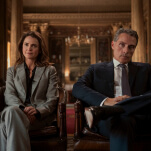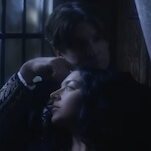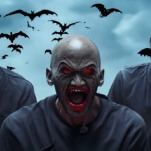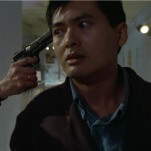Kira's Reason: A Love Story

The 21st film to receive official Dogme certification, and one of the few unharmed by its minimalist limitations, Ole Christian Madsen's powerful Kira's Reason: A Love Story could be the undercard to A Woman Under The Influence, John Cassavetes' seminal study of a marriage and mental illness. Beginning with a wife's return home after time in a psychiatric ward, both films gain their tension from the strained attempt to return to normalcy after everything has irrevocably changed, a transitional phase made all the more painful by brief flashes of the couple's old dynamic. Though Madsen's middle-class heroes have little in common with Cassavetes' more combative blue-collar counterparts, their reunion is similarly raw, painful, and unexpectedly romantic, as they try to redefine their relationship around a new set of terms. Looking and acting uncannily like a young Geneviève Bujold, Stine Stengade gives a touchingly unhinged performance as the title character, a madwoman who tries to find her footing as a wife and mother after being committed for an unspecified condition. While she was away, her husband Lars Mikkelsen had an affair with her sister, but he seems genuinely willing to grant her every opportunity to reenter their lives. Though she works hard to keep up appearances, Stengade's mood swings throw her so far off-balance that even her ecstatic moments are temporary and disturbingly artificial, a hairsbreadth away from collapse. Mikkelsen strenuously professes his love for her and tries to remain patient, but her erratic behavior–highlighted by a breakdown at a public pool and a one-night stand with a random barfly–begins to wear him down. In a desperate gesture, he allows her to make the arrangements for an elaborate business dinner at a luxury hotel, an event that serves as the ultimate test of her withered sanity. The tortured interplay between Stengade and Mikkelsen lies at the heart of Kira's Reason, but Madsen errs by grabbing for simple explanations for her madness elsewhere, such as the father (Sven Wollter) who abandoned her during childhood or a tragic revelation buried in the third act. Why give the game away when the actors suggest their characters' inner workings with such delicacy and precision? Until its pat, implausible conclusion, the film has the edgy nerve of a classic amour fou, charting a complex relationship with the sort of bumpy, unpredictable spirit that would do Cassavetes proud.







































